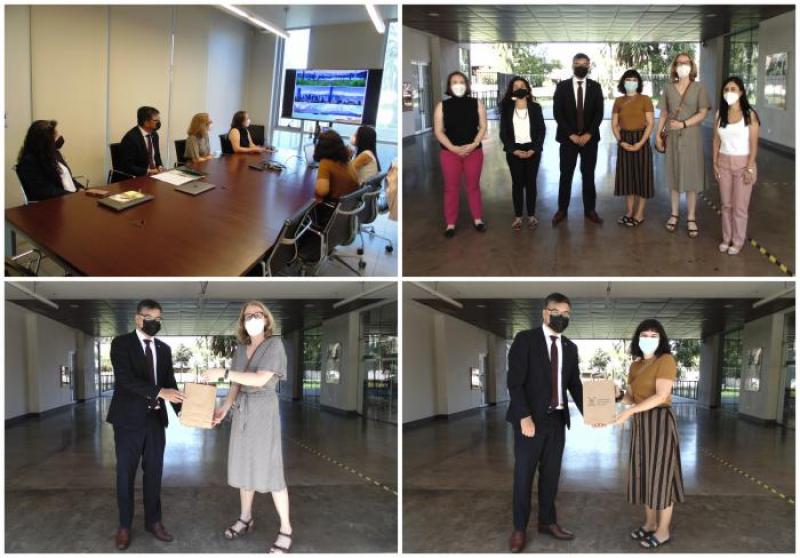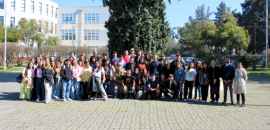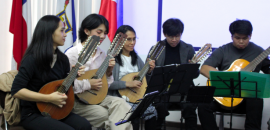- Español
- English
You are here
Free University of Berlin and USACH celebrate joint collaboration on gender, diversity and equity matters
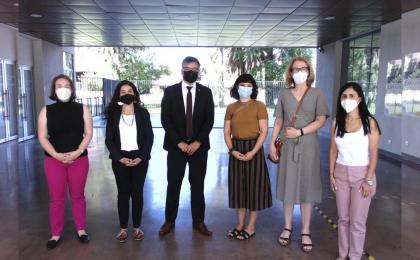
A delegation composed of two members of the Center for Gender Studies of the Free University of Berlin met with Usach authorities and part of the Usach International team. The purpose of the meeting was to deepen and strengthen cooperation ties within the framework of the Interinstitutional Agreement of the Erasmus+ Program.
The first international visit of 2022 took place this Monday, after an extended period of telematic modality due to the pandemic. This time, it was the visit of a delegation from the Free University of Berlin (FUB). The purpose of the visit was to deepen and strengthen the ties of cooperation that our university has historically had with German universities, and of course with the FUB, in research projects and institutional collaboration.
This visit took place in the context of a joint collaboration in the areas of gender, diversity and equity, in the framework of the Inter-institutional Agreement of the Erasmus+ Program, signed by both universities in 2020.
The FUB delegation was composed of Dr. Heike Pantelmann, general director of the Margherita von Brentano Center for Gender Studies, and Dr. Sabina Garcia Peter, in charge of Support to junior researchers, Digitization in gender studies and Scientific Communication of the same center. On behalf of the Usach, the prorector, Dr. Jorge Torres, the director of the Directorate of Gender, Diversity and Equity, Dr. Karin Baeza, and three members of the Usach International team were present: Mayerley Pacheco, coordinator of International Cooperation and Visits; Molly Dennen, director of the Center for Languages and Interculturality; and Paula Mondaca, coordinator of International Visitors.
"The construction of universities with greater social justice and a culture of gender equality is a global challenge, so we are not going to achieve it with the autonomous work of any university. That is why international and national networks are so important for us," Dr. Baeza commented on the need to work together on gender and diversity issues, adding that "international alliances, such as the one we are consolidating today with the Free University of Berlin, are super necessary."
Regarding the same topic, the director of the Center for Gender Studies at FUB, Dr. Heike Pantelmann, pointed out that "it is very important to work jointly on gender issues, because these issues are international, they are relevant in all countries, but there are also types of national particularities and that is why it is very good to be in contact with others". In addition, Director Pantelmann revealed that "at the center we are very happy to be here and we hope to establish a long-lasting collaboration between our two universities and the two centers."
When asked about the importance of working collaboratively and internationally on issues related to gender and diversity, the prorector Dr. Jorge Torres focused on science and globality, pointing out that "technology and educational development must have an international character. The concept of interconnection today has to become not only the spirit, but also part of the field and of the action that we have to lead within the university".
For Dr. Sabina Garcia Peter, this collaboration between the two universities was doubly special, since she is Chilean and, in her own words, "I had the task of re-establishing and strengthening my ties with Chile". Regarding the expectations of the joint work between the Center for Gender Studies of the FUB and the Direction of Gender, Diversity and Equity Usach, García Peter commented that "we are very interested in the whole trajectory and the work that colleagues have done here in the fight against gender violence at the university level, something that for us is a very strong focus. We believe that we have a lot to learn from the experience here and that it can be a very reciprocal relationship".
The cooperative relationship with the Free University of Berlin dates back to 2016, with the signing of a research agreement at the graduate level. However, it should be noted that the Usach additionally has a historical link of more than 40 years with various German Institutions and universities. Since then, the University of Santiago de Chile has progressively strengthened its academic, cultural and research links, reflected in the more than 60 agreements signed and with a total student mobility of more than 300 students in the last 5 years.
That is why this meeting symbolizes the first step of a new path that will seek to promote the exchange of ideas, the identification of potential areas of interest and the beginning of a roadmap to advance international collaboration projects in the area of gender, a relevant topic both nationally and internationally, and with which our university has a deep commitment.
News
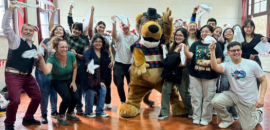 International students learn cueca with Usach Without Borders and Department of Cultures and Arts
International students learn cueca with Usach Without Borders and Department of Cultures and Arts
12 Sep 2024
 Rector Vidal to join the Governing Board of UNESCO's International Institute for Higher Education
Rector Vidal to join the Governing Board of UNESCO's International Institute for Higher Education
2 Sep 2024
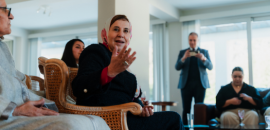 Students visited the Ambassador of Morocco to learn about the country's diplomatic work and culture
Students visited the Ambassador of Morocco to learn about the country's diplomatic work and culture
25 Jul 2024

